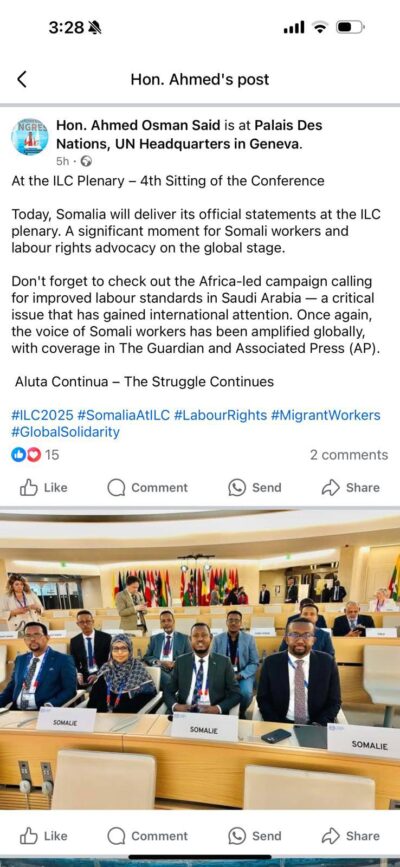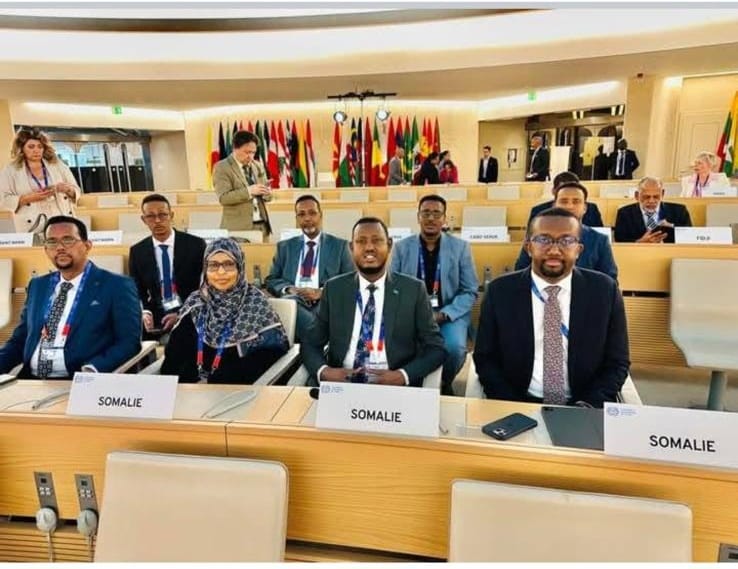Tensions are rising between Somalia and Saudi Arabia following the active participation of Somalia’s official delegation in a high-profile Africa-led campaign at the 113th Session of the International Labour Conference (ILC) in Geneva. The campaign, which calls for improved labour standards in Saudi Arabia—particularly for migrant workers—has gained international media coverage, including in The Guardian and Associated Press (AP).
The Somali delegation, led by the Minister of Labour and Social Affairs, H.E. Yusuf Mohamed Adan, has come under scrutiny for its role in supporting the campaign. Members of the Somali delegation, including representatives of the Federation of Somali Trade Unions (FESTU), have been visibly active in advocating for labour reforms in the Kingdom of Saudi Arabia, a move that has provoked a strong reaction from the Saudi delegation present in Geneva.

A brief post by the President of FESTU on his Facebook page showed the Minister as part of the campaign, further reinforcing perceptions that Somalia’s participation was deliberate and officially sanctioned.
Notably, Somalia appears to be the only country from East Africa or the Arab world whose government delegation has openly participated in the campaign targeting Saudi Arabia. The absence of other regional delegations highlights the unique and controversial nature of Somalia’s stance and raises serious questions about the diplomatic foresight behind such participation.
Sources close to the Saudi delegation indicate that high-level meetings are currently being held in Switzerland by Saudi officials from the Ministry of Human Resources and Social Development and the Saudi Mission to the United Nations. These discussions reportedly reflect “deep concern and disappointment” at Somalia’s position, given the historically strong diplomatic, economic, and religious ties between the two nations.
“Saudi Arabia has been a steadfast ally and development partner to Somalia for decades,” said one diplomatic source. “It is deeply troubling to see Somalia, a brotherly nation, allow its official delegation to be used in a campaign that publicly attacks our country without prior diplomatic engagement.”
The campaign’s language and tone—especially from union representatives reportedly affiliated with Somalia’s official delegation—are seen by some as inflammatory and could jeopardize not only bilateral cooperation but also ongoing support from Riyadh for development and humanitarian programs in Somalia.
The inclusion of trade union figures who have publicly criticized Saudi Arabia has raised questions about how the Somali delegation was composed, and whether the government anticipated the diplomatic fallout. Critics argue that the participation of Minister Yusuf Mohamed Adan in the campaign represents a serious miscalculation at a time when Somalia relies on Saudi political and financial backing for stability, investment, and labor migration arrangements.
Given the diplomatic sensitivity and the high-level implications of Somalia’s involvement in the public criticism of Saudi Arabia at the ILC, observers and analysts are calling for clarity. The silence from the Somali Mission in Geneva is becoming increasingly noticeable—and troubling—especially as the fallout threatens to strain the historically close relationship between Somalia and the Kingdom of Saudi Arabia.
As of now, neither the Somali government nor the Ministry of Labour and Social Affairs has issued a public statement on the matter. It remains to be seen whether backchannel diplomacy can defuse the growing tension and preserve the long-standing and strategic relationship between Somalia and Saudi Arabia.
The key question now being asked is: Why has the Permanent Mission of the Federal Republic of Somalia to Switzerland remained silent? And more importantly, why is Ambassador Khadra Ahmed Duale—who leads the mission—appearing to be complicit or aligned with this campaign?


COMMENTS